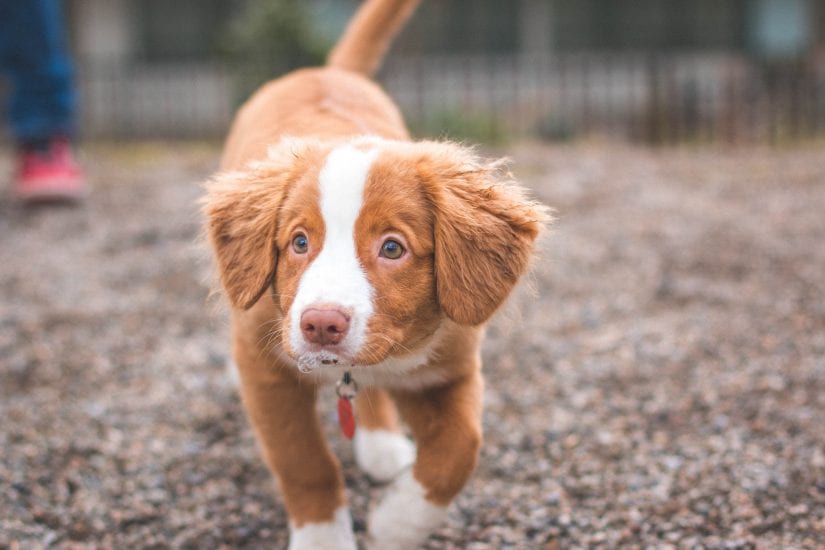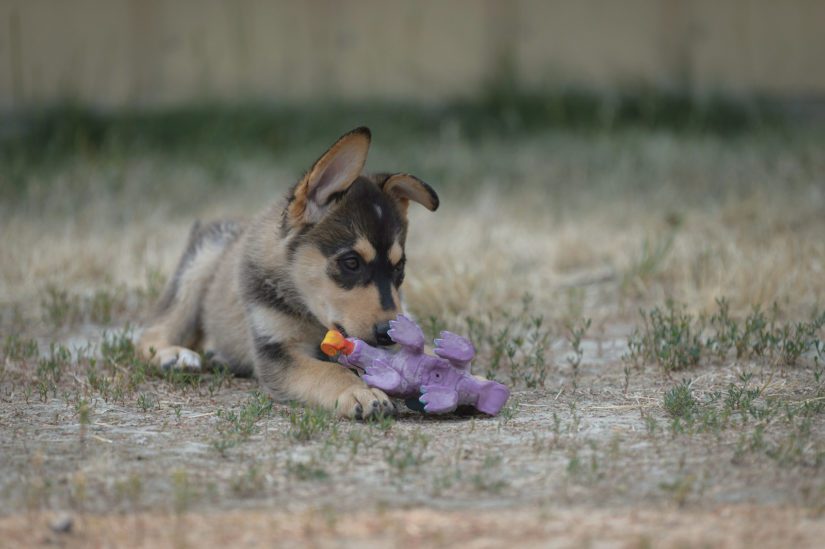Caring for a puppy takes time, effort and patience. How they are raised helps shape the dog’s personality when they become an adult.
So how to care for a puppy? Feed, train and socialize your puppy. Play with them and keep them safe. In return, they will give you a lifetime of companionship. Talk about time and effort well spent!
Here are six tips to help you care for your growing puppy.

1. Food for thought: starting your pup with the right food
Puppies should be fed high-quality puppy food three to four times a day. Once they are about six months old, they can be fed twice daily.
At around one year of age, gradually switch to high-quality adult food. Adult dogs should be fed two meals a day. Leaving food out all the time can make them overweight.
Pay attention to what they like and what their favourite treats are. Identifying the treats that motivate them will come in handy at training time!
Take feeding time as an opportunity to provide enrichment for your dog. Brigette Mayer, AnimalKind accredited dog trainer, suggests letting your puppy search or forage for their food to help provide an enriching olfactory environment for your dog.
2. Bathroom breaks: housetraining your puppy
Housetraining means teaching puppies to go to the bathroom where you would like them to go – usually outside, on the grass.
Puppies have very little bladder and bowel control, so expect to make outside bathroom trips often. Usually, a puppy can hold their waste for approximately the same number of hours as their age in months. As they get older, puppies can go longer between potty times, which means fewer bathroom outings.
Use positive reinforcement to help your puppy learn! That means praising them for going in the right spot. Plan for potty breaks and try to establish a routine, but keep in mind that your puppy will have accidents. Never hit or yell when they have an accident in the house.
3. Play on: keeping your puppy active!
Puppies are super playful and have a lot of energy. Use toys to play with them and not your hands and feet to prevent encouraging play biting. Also, keep playtimes short. Puppies can easily get overexcited and accidentally nip.
Chewing is a natural behaviour, so make sure dogs of any age have plenty of safe toys to gnaw on. AnimalKind accredited trainer Sandy Middleton explains guardians can support their puppy by understanding their essential needs. As a guardian, you are a big part of helping your dog express their natural behaviours, so let your dog be a dog!

4. Puppy proof: managing your puppy environment
Puppies explore the world with their mouths and can easily get into dangerous situations. You name it – electrical cords, table legs, books, shoes – they will try it! Keep anything that you do not want chewed out of reach.
Manage your puppy’s environment to keep them safe. You can use baby gates to contain the puppy to safe areas in your house. This will also make it easier to tell when they need to go outside for a potty break.
5. Social skills: socialization for puppies
Socialization is crucial for puppies and involves exposing your puppy to new experiences in a way that is positive for them. Positive experiences early on in life teach dogs to face new situations with confidence. Introduce your puppy to new people, pets, places and experiences in a safe and fun way. It can include care activities, like nail trims, teeth brushing, grooming, and experiences like car trips, visits to the veterinarian, and walks near playgrounds or on a beach.
Going to “puppy classes” is also an excellent way to socialize your puppy in a safe, controlled way. Classes are designed not only to meet other puppies and people but to also introduce them to new experiences like walking on different surfaces, seeing uncommon things and hearing different noises.
Reward puppies with praise and treats to encourage friendly and outgoing behaviour, and be aware of their body language, especially if they are showing signs of fear. Every puppy is different and needs to proceed at a pace that is comfortable for them.
Exposing your puppy to new experiences in a positive way will help them (and you!) in the future. Check with your vet about protective vaccines and avoid locations where infectious diseases might be spread.
6. Find a good puppy trainer: create a strong bond with your pup
Whether you are a new dog owner or have had dogs all your life, everyone can benefit from attending classes with a professional reward-based dog trainer.
Working with a humane dog trainer who prioritizes dog welfare and uses evidence-based methods will improve communication and rapport with your pup, resulting in a stronger bond between you and your dog and a rewarding relationship for years to come!
Find a dog trainer using the list of humane trainers that the BC SPCA recommends on the AnimalKind site. That way, you are sure you work with a trainer who only uses kind, gentle methods.
Useful resources:
AnimalKind: A step-by-step guide to new dog guardians
AnimalKind: How to choose a dog trainer

